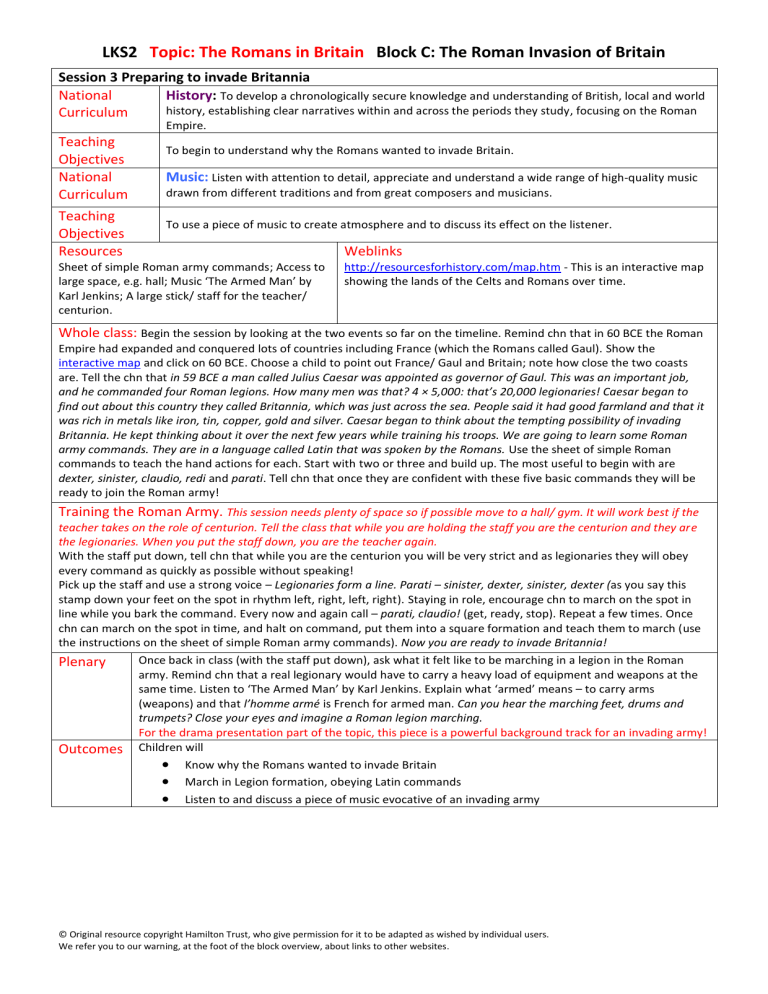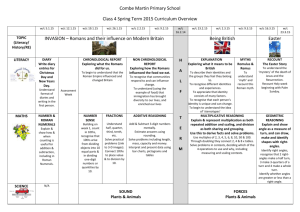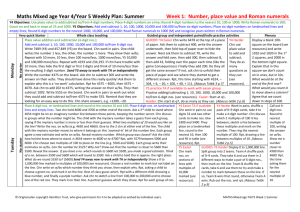Session 03 - Hamilton Trust

LKS2 Topic: The Romans in Britain Block C: The Roman Invasion of Britain
Session 3 Preparing to invade Britannia
National History :
To develop a chronologically secure knowledge and understanding of British, local and world
Curriculum
history, establishing clear narratives within and across the periods they study, focusing on the Roman
Empire.
Teaching
Objectives
National
Curriculum
To begin to understand why the Romans wanted to invade Britain.
Music:
Listen with attention to detail, appreciate and understand a wide range of high-quality music drawn from different traditions and from great composers and musicians.
Teaching
Objectives
To use a piece of music to create atmosphere and to discuss its effect on the listener.
Resources
Sheet of simple Roman army commands; Access to large space, e.g. hall; Music ‘The Armed Man’ by
Karl Jenkins; A large stick/ staff for the teacher/ centurion.
Weblinks
http://resourcesforhistory.com/map.htm
- This is an interactive map showing the lands of the Celts and Romans over time.
Whole class:
Begin the session by looking at the two events so far on the timeline. Remind chn that in 60 BCE the Roman
Empire had expanded and conquered lots of countries including France (which the Romans called Gaul). Show the interactive map and click on 60 BCE. Choose a child to point out France/ Gaul and Britain; note how close the two coasts are. Tell the chn that in 59 BCE a man called Julius Caesar was appointed as governor of Gaul. This was an important job, and he commanded four Roman legions. How many men was that? 4 × 5,000: that’s 20,000 legionaries! Caesar began to find out about this country they called Britannia, which was just across the sea. People said it had good farmland and that it was rich in metals like iron, tin, copper, gold and silver. Caesar began to think about the tempting possibility of invading
Britannia. He kept thinking about it over the next few years while training his troops. We are going to learn some Roman
army commands. They are in a language called Latin that was spoken by the Romans. Use the sheet of simple Roman commands to teach the hand actions for each. Start with two or three and build up. The most useful to begin with are
dexter, sinister, claudio, redi and parati. Tell chn that once they are confident with these five basic commands they will be ready to join the Roman army!
Training the Roman Army.
This session needs plenty of space so if possible move to a hall/ gym. It will work best if the teacher takes on the role of centurion. Tell the class that while you are holding the staff you are the centurion and they are the legionaries. When you put the staff down, you are the teacher again.
With the staff put down, tell chn that while you are the centurion you will be very strict and as legionaries they will obey every command as quickly as possible without speaking!
Pick up the staff and use a strong voice – Legionaries form a line. Parati – sinister, dexter, sinister, dexter (as you say this stamp down your feet on the spot in rhythm left, right, left, right).
Staying in role, encourage chn to march on the spot in line while you bark the command. Every now and again call – parati, claudio! (get, ready, stop). Repeat a few times. Once chn can march on the spot in time, and halt on command, put them into a square formation and teach them to march (use the instructions on the sheet of simple Roman army commands). Now you are ready to invade Britannia!
Plenary
Outcomes
Once back in class (with the staff put down), ask what it felt like to be marching in a legion in the Roman army. Remind chn that a real legionary would have to carry a heavy load of equipment and weapons at the same time. Listen to ‘The Armed Man’ by Karl Jenkins. Explain what ‘armed’ means – to carry arms
(weapons) and that l’homme armé is French for armed man. Can you hear the marching feet, drums and trumpets? Close your eyes and imagine a Roman legion marching.
For the drama presentation part of the topic, this piece is a powerful background track for an invading army!
Children will
Know why the Romans wanted to invade Britain
March in Legion formation, obeying Latin commands
Listen to and discuss a piece of music evocative of an invading army
© Original resource copyright Hamilton Trust, who give permission for it to be adapted as wished by individual users.
We refer you to our warning, at the foot of the block overview, about links to other websites.







